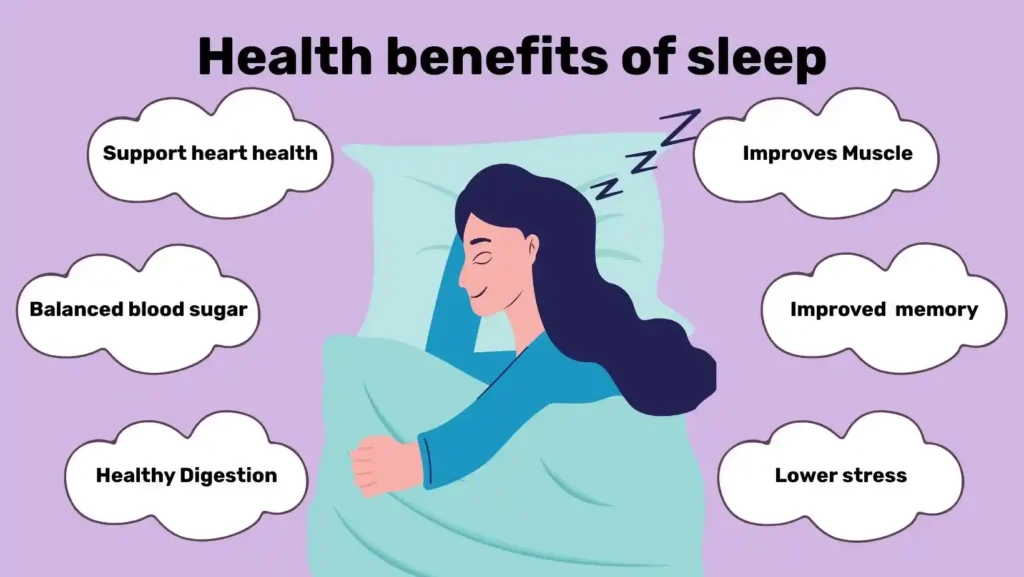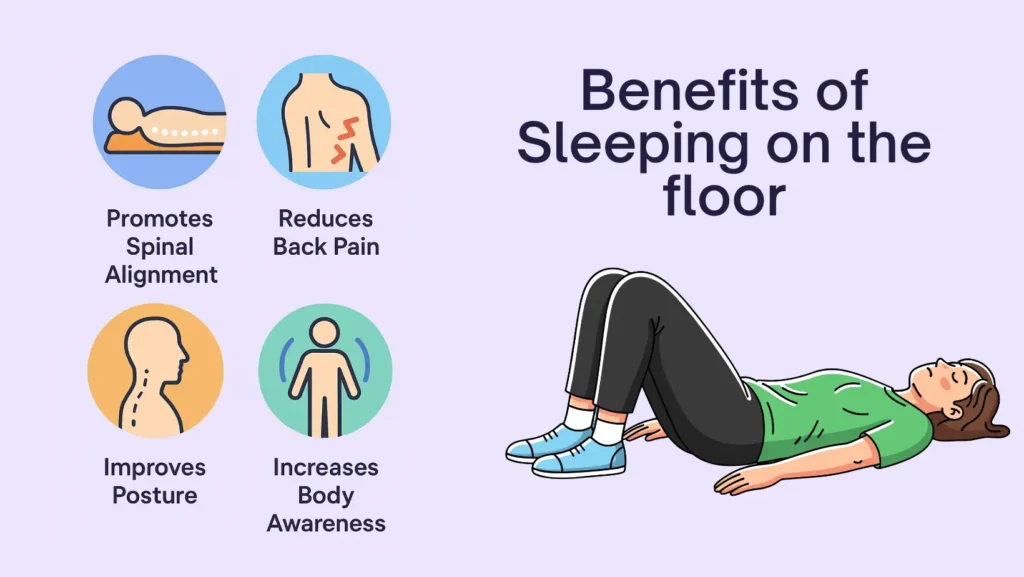Sleep is a biological reset that restores both body and mind. The benefits of sleep go far beyond feeling refreshed. During sleep, your brain organizes thoughts and memories, while your body repairs muscles, restores energy, and balances hormones.
Without enough quality rest, every system (from your heart to your immune function) starts to struggle. Getting proper sleep is as vital as eating well or exercising because it shapes how you think, feel, and function each day.
Why Is Sleep So Important for Health?
Sleep is the body’s main repair time. When you sleep, your cells fix damage. Your brain sorts memories. Hormones reset. Your immune system strengthens. These are clear benefits of sleep you feel every day. Good sleep keeps your heart and metabolism steady. Poor sleep raises risk for long-term illness. You need sleep to think clearly and to heal.
Role Of Sleep In Physical Repair And Recovery
During deep sleep, your body releases growth hormone. Growth hormone helps tissue and muscle heal. Your muscles rebuild after exercise. Your skin repairs tiny tears. White blood cells work better to fight infection. If you nap after heavy activity, you speed recovery. That faster healing is one strong benefits of sleep.
How Sleep Supports Brain And Memory Function
Sleep moves short-term memories into long-term storage. This process helps you learn new facts. You will recall names and tasks better after a good sleep. Creativity and problem-solving grow when you sleep well. Clear recall the next day is a direct benefit of sleep.
Importance Of Deep Sleep For Hormone Balance
Deep sleep reduces stress hormone levels. It also balances hunger hormones (leptin and ghrelin). When you sleep well, you feel less hungry and more satisfied. Insulin works better when you rest. Hormone balance is a key benefit of sleep that affects weight and energy.
Why Consistent Sleep Patterns Prevent Chronic Illness
A steady sleep time lowers inflammation. It helps blood pressure stay normal. Night after night of good rest reduces the chance of heart disease and diabetes. Regular sleep also keeps mood and focus stable. These effects are long-term benefits of sleep you earn each night.
Key Benefits Of Getting Enough Sleep
Getting enough rest changes how you feel and perform.
Boosts Energy And Mental Alertness
You feel awake and ready when you sleep enough. Your reaction time improves. You make fewer simple mistakes. That steady energy is a direct benefit of sleep.
Improves Focus And Productivity
You can concentrate longer and finish tasks faster. Focus feels easier. Work or school performance will improve with regular sleep. This is an important benefit of sleep for learning and work.
Strengthens Heart And Immune System
Good sleep helps your immune cells fight bugs. It lowers stress on the heart. Over time, these changes reduce disease risk. Better disease defense is one real benefits of sleep.
Supports Healthy Weight And Metabolism
Sleep balances appetite and how your body uses sugar. When you sleep well, you are less likely to crave sugary snacks. You burn energy more evenly. Weight control is one strong benefits of sleep.
Enhances Emotional Stability And Mood
You will feel calmer and less reactive. Small problems feel smaller after sleep. Stable mood is another clear benefit of sleep.
Sleep And Brain Function
How Sleep Helps With Learning And Memory
After you study, sleep helps lock information in. Skills get better with practice plus sleep. If you aim to learn a new task, plan a rest after practice. Improved learning is a firm benefit of sleep.
Reduces Stress And Anxiety Naturally
Sleep lowers stress chemicals. You will face stress with more control after rest. This natural calm is a clear benefit of sleep.
Clears Toxins And Improves Cognitive Performance
While you sleep, fluid flow in the brain clears waste. This cleaning makes thinking faster the next day. Better focus and clarity are direct benefits of sleep.
Physical Health Benefits Of Sleep
Improves Muscle Repair And Athletic Recovery
Athletes gain strength faster with enough deep sleep. Muscle fibers repair and grow during rest. Recovery speed and performance both benefit. That is a physical benefit of sleep.
Regulates Blood Sugar And Insulin Levels
Poor sleep makes blood sugar control worse. Good sleep makes insulin work better. This reduces your long-term diabetes risk. Balanced blood sugar is another benefit of sleep.
Supports Healthy Digestion And Metabolism
Sleep helps digestion run on a steady schedule. Appetite signals stay balanced. Your body uses food for fuel more efficiently. That steady metabolism is a useful benefit of sleep.
Helps Fight Inflammation And Chronic Fatigue
Rest lowers markers of inflammation. Over time, this means less joint pain and less constant tiredness. Lower inflammation is one of the more lasting benefits of sleep.
Benefits Of Sleeping Naked
Sleeping without clothes can improve cooling. Lower skin temperature helps you reach deep sleep faster. That is one of the benefits of sleeping naked. You may sweat less and keep your skin drier. Your skin can breathe and repair better. Improved hormone regulation and comfort can follow.
For couples, sleeping without clothes can increase closeness and comfort at night. These practical changes explain why some people prefer the benefits of sleeping naked.
Benefits Of Sleeping On Your Back
Sleeping flat on your back supports spine alignment. This reduces neck and back strain for many people. It also avoids facial pressure that can cause wrinkles.
Lying on your back helps clear nasal passages and reduce acid reflux. These are core benefits of sleeping on your back. If you find back sleep comfortable, it often gives good spinal support and less pain.
Benefits Of Sleeping On The Right Side
Lying on the right side can ease heartburn for some people. It can also help food move through the digestive tract more smoothly. Right-sided sleep may reduce snoring and improve airway flow in certain cases.
Doctors sometimes recommend side sleep during pregnancy. These are clear benefits of sleeping on the right side that many people notice.
Benefits Of Sleeping On The Floor
A firm surface can nudge your spine into a neutral line. Some people feel less lower back pain after short tests of floor sleep. Floor sleep may increase body awareness and improve posture over time.
If you try floor sleep, start slowly and use a thin pad. These measured trials can show the benefits of sleeping on the floor without harm.
Benefits Of Baby Sleeping On Tummy (With Caution)
Tummy time while the baby is awake strengthens neck and upper body muscles. That helps motor control and head lifting. Short supervised tummy naps while the baby is awake can show some benefits of the baby sleeping on the tummy for strength.
However, unsupervised tummy sleep raises SIDS risk. Always follow safe sleep rules. Use tummy time only while the baby is awake and watched closely.
How Sleep Impacts Emotional And Mental Health
Sleep improves your ability to handle stress. It sharpens decision-making and fuels creative thinking. You will think more clearly and feel more optimistic. Better sleep reduces anxiety and improves mood stability. All these outcomes are core benefits of sleep for your mind.
How To Improve Sleep Quality
You can change your sleep with clear steps.
- Keep a steady bedtime and wake time.
- Stop caffeine after midday.
- Dim screens an hour before bed.
- Make your room cool, dark, and quiet.
- Practice slow breathing or light stretching.
- Avoid heavy meals late at night.
These habits increase deep sleep and REM sleep. They make the benefits of sleep more consistent.
Common Sleep Problems And When To Seek Help
Snoring with pauses may be sleep apnea. Trouble falling asleep often is insomnia. Restless legs cause sudden limb movement. If poor sleep limits your day, see a doctor. A sleep test can find major issues. Early treatment protects your health and keeps the benefits of sleep working for you.
How To Improve Sleep For Specific Goals
If you want to lose weight, focus on sleep timing and protein at dinner. If you want better mood, aim for at least seven hours nightly. For athletic recovery, schedule naps after heavy training. These target steps make the benefits of sleep match your goals.
Practical Nightly Routine You Can Use
Set a fixed sleep time. Lower lights 60 minutes before bed. Turn off electronics. Take a warm shower then cool the room. Do five minutes of deep breathing. Try a short book with low mental demand. Small nightly routines build large sleep gains and steady benefits of sleep.
Safety Notes For Babies And Tummy Time
Always place infants on their back to sleep unless a doctor tells you otherwise. Use a firm mattress and no loose pillows or blankets. Give supervised tummy time for muscle strength while awake. These rules prevent danger and allow safe benefits of baby sleeping on tummy practice.
When To See A Sleep Specialist
If daytime sleepiness persists after improving habits, seek help. If breathing stops during sleep, see a doctor quickly. If you suffer severe restless legs or frequent awakenings, a specialist can test and treat. Timely care restores the real benefits of sleep.
FAQs
How Many Hours Of Sleep Do Adults Need Daily?
Most adults need seven to nine hours of sleep each night for good health, memory, and hormone balance to gain the main benefits of sleep.
What Happens If I Don’t Get Enough Sleep?
You will feel tired, make more mistakes, and have a worse mood. Long-term lack raises heart disease and diabetes risk and reduces the benefits of sleep.
Does Sleep Really Affect Weight And Metabolism?
Yes. Poor sleep changes hunger hormones and insulin, which causes weight gain. Good sleep supports steady metabolism and is a key benefit of sleep.
What Are The Top Health Benefits Of Sleep?
Top benefits include better mood, sharper memory, stronger immunity, and lower heart risk. These are the lasting benefits of sleep you notice in daily life.
Is Sleeping On The Floor Good For Your Back?
Some people report less back pain with a firm surface after testing slowly. Start with short naps to judge the benefits of sleeping on the floor safely.
What’s The Healthiest Sleep Position?
Side or back positions are best for most people. Pick what keeps your airway open and spine aligned to protect the benefits of sleep.
Why Is Sleeping On The Right Side Recommended?
The right side can ease heartburn and help digestion in many people. It may improve airway flow and reduce reflux, so it shows clear benefits of sleeping on the right side.
Is It Safe For Babies To Sleep On Their Tummy?
No for unsupervised sleep. Tummy time is good only while the baby is awake and watched. This way you see the safe benefits of baby sleeping on tummy without risk.
Can Better Sleep Boost Immunity?
Yes. Rest supports white blood cell function and vaccine response. Better sleep strengthens your immune defenses and shows concrete benefits of sleep.
What Habits Improve Sleep Naturally?
Keep a fixed sleep time, avoid late caffeine, make a cool, dark room, and limit screens before bed. These steps increase the real benefits of sleep.
How Long Does It Take To Recover From Sleep Deprivation?
Most people regain normal function after several nights of good sleep. Full repair may take longer for long-term debt, but benefits begin quickly.
When Should I See A Doctor For Sleep Problems?
See a doctor if sleep loss affects daily life or if you or others notice loud snoring with pauses. Quick care protects the benefits of sleep.
Are There Benefits Of Sleeping Naked For Skin And Hormones?
Sleeping without clothes can improve cooling and reduce night sweats. Better skin comfort and hormone balance are common benefits of sleeping naked.


















Leave a Comment